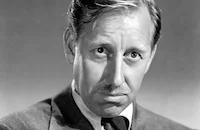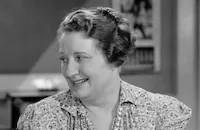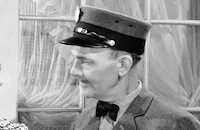Shockproof

Brief Synopsis
Cast & Crew
Douglas Sirk
Cornel Wilde
Patricia Knight
John Baragrey
Esther Minciotti
Howard St. John
Film Details
Technical Specs

Synopsis
When ex-convict Jenny Marsh visits her Los Angeles parole officer, Griff Marat, he lists the conditions of her parole: she must report to him every day and she must not carry a weapon or get married. He also warns her to stay away from Harry Wesson, who was partially responsible for her involvement in crime. Griff helps Jenny find a place to live and a job, but Jenny resumes her relationship with Harry, despite Griff's warning. Later, Jenny is picked up during a raid on the bookie joint where Harry took her. Despite her violation, Griff believes that Jenny will successfully straighten out her life, an opinion that is reinforced by the psychologist who examines her. Even though Jenny realizes that Harry is a bad influence, she makes a date with him, but when she leaves her room to go meet him, she finds Griff waiting for her. He offers to take her to dinner, and she is forced to accept. Griff also picks up his younger brother Tommy, Tommy's friend Barry and Fred Bauer, another parolee, and brings the whole group to his house, where he lives with Tommy and their blind mother. At first, Jenny is angry and tells Griff that Harry is the only man who was ever kind to her. She admits that she would do anything for him, including murder. Because she lost her job after the raid, Griff offers her a position caring for his mother during the day in return for room and board. Jenny meets secretly with Harry, begging him to help her leave town because she believes that Griff is falling in love with her, but Harry suggests that she encourage Griff's infatuation. One night, when they are alone, Griff tells Jenny that his office received a request for her transfer to San Francisco. She turns down the opportunity to leave, and because he knows that Harry arranged the transfer, Griff is pleased. Later that night, Griff asks Jenny to marry him. Although she refuses, Harry encourages her to go through with the marriage because by thus breaking her parole, she would quash Griff's political ambitions. Determined to spare Griff, Jenny runs away, but Griff goes after her and insists that they get married secretly. After the marriage, Jenny breaks off her connection with Harry, causing him to come to Griff's house to speak to her. Griff encounters him there, and the two men quarrel. Later Harry telephones Griff, saying that he has information about his wife. Griff finds a severely wounded Harry, along with a note from Jenny begging Harry to take her away. Convinced that Jenny shot Harry, he coldly decides to turn her in, but his mother is sure that Jenny shot Harry out of love for Griff. Griff then resolves to escape to Mexico with Jenny. They are recognized before they can cross the border, but manage to escape to another state on a bus. There, Jenny dyes her hair, and Griff gets a job working at an oil refinery. Eventually a photograph of the couple appears in the newspapers and, tired of running, Jenny insists that they give themselves up. Harry is still in the hospital, but he tells the police that the shooting was an accident, assuring Griff and Jenny that they can now live an honest life together.

Director

Douglas Sirk
Cast

Cornel Wilde
Patricia Knight
John Baragrey
Esther Minciotti

Howard St. John
Russell Collins
Charles Bates
Gilbert Barnett
Frank Jaquet

Frank Ferguson

Ann Shoemaker

King Donovan
Claire Carleton
Al Eben

Fred Sears
Jimmy Lloyd
Isabel Withers
Chuck Hamilton
Brian O'hara

James Flavin
Virginia Farmer
Earle Hodgins
Lester Sharpe
Charles Marsh
George J. Lewis
Paul Bryar
Shirley Adams
Yolanda Lacca
Argentina Brunetti
Charles Jordan
Buddy Swan
Robert Scott
Norman Ollestad

John A. Butler
Crane Whitley
Robert R. Stephenson

Richard Benedict
Arthur Space
Cliff Clark
Nita Mathews
Pete Kooy
Victor Romito
Thomas Kingston
Joseph Palma
Robert Strong
Ernesto Morelli
Daniel Nelson
Edward Foster
Crew
Carl Anderson
Earl Bellamy
Clay Campbell
Lodge Cunningham
Helen Deutsch
Louis Diage
George Duning
Samuel Fuller
Gene Havlick
Helen Hunt
Charles Lawton Jr.
Jean Louis
Earl Mcevoy
M. W. Stoloff

Videos
Movie Clip


Film Details
Technical Specs

Articles
Shockproof
Knight made her film debut without Wilde beside her in Fox's Roses Are Red (1947). Critical response to the acting of the hazel-eyed platinum blonde is often unkind but Knight brings an invigorating edginess to Shockproof, the combination of a lack of polish and the "angular handsomeness" (as Sirk put it) of her looks which distinguished the Boston-born actress from the dewier likes of Ava Gardner and Rita Hayworth. While Wilde plays his righteous parole officer by the book, Knight's femme fatale (who has spent five years in prison after taking a murder rap for her gambler boyfriend) is enigmatic, capricious, breathless and cruel...just the cocktail for making good guys go bad.
Shockproof was an early script by Sam Fuller, still fresh from his experiences with the 16th Infantry in World War II and having just turned down a seven year contract with MGM. Although the title seems like vintage Fuller (given that he wrote and directed the 1963 film Shock Corridor), the original screenplay was titled The Lovers, as Wilde's and Knight's outlaw couple (who have married in secret and in so doing have violated the conditions of her parole) are labeled by the tabloids in the film's third act. The executives at Columbia not only ordered the title change but trucked in writer Helen Deutsch to soften the sharp edges of Fuller's "gutty" (Sirk's word) scenario. (Deutsch later adapted Lillian Roth's biography I'll Cry Tomorrow and Jacqueline Susann's trash classic Valley of the Dolls for the big screen.)
Lost in the rewriting was a more violent conclusion, in which Wilde's compromised Griff Marat (Fuller recycled the name Griff for The Naked Kiss in 1964) proves his love for Knight by taking on the police in a pitched gun battle. In its place, Deutsch had the fugitives simply give themselves up to the authorities following the unhappy realization that they can't make a go of it in a world of decent people. In a final scene not directed by Sirk, the lovers are saved at the last minute when villain John Baragrey (whom Knight has gunned down, an act of desperation meant to protect Wilde but which instead precipitates his moral tumble) lies to the police to clear the protagonists of wrongdoing, thus altruistically paving the way for their happiness as a proper man and wife. It's an unlikely, even laughable denouement that nonetheless supports the film's central theme that anyone, no matter how straight-shooting, can become a criminal if the breaks are against them.
Douglas Sirk was unhappy with the experience of making Shockproof and left Columbia and the United States shortly after completing the picture to return to Germany. The homecoming, however, proved to be far from sweet and Sirk would beat a retreat back to American shores after only a year abroad. For United Artists, he threw himself into making The First Legion (1951) starring Charles Boyer. The film is widely considered to be the first of Sirk's masterpieces and the filmmaker himself rarely looked back to the debacle of Shockproof. That's too bad, as the film has, for all its shortcomings, much to recommend it. Location shooting in and around downtown Los Angeles (in particular, the Bunker Hill section seen in Robert Aldrich's Kiss Me Deadly [1955] and the landmark Bradbury Building, used in films from Double Indemnity [1944] to Blade Runner [1982]) gives the proceedings an open air freshness that never quite steps over into the docu-drama verité of Alfred Werker and Anthony Mann's He Walked by Night (1948) and Jules Dassin's The Naked City (1948).
Shockproof is seductively photographed by Charles Lawton, Jr. (The Lady from Shanghai, 1947) and proud in vivid character work by such familiar faces as King Donovan (Invasion of the Body Snatchers, 1956), Ann Shoemaker (Alice Adams, 1935), James Flavin (Armored Car Robbery, 1950) and Esther Minciotti (Marty, 1955), as Wilde's Italian "mama mia" who, though blind, can tell from a single shake of Knight's hand that collar and cuffs don't match.
Producers: Helen Deutsch, S. Sylvan Simon
Director: Douglas Sirk
Screenplay: Helen Deutsch, Samuel Fuller
Cinematography: Charles Lawton, Jr.
Art Direction: Carl Anderson
Music: George Duning
Film Editing: Gene Havlick
Cast: Cornel Wilde (Griff Marat), Patricia Knight (Jenny Marsh), John Baragrey (Harry Wesson), Esther Minciotti (Mrs. Marat), Howard St. John (Sam Brooks), Russell Collins (Frederick Bauer), Charles Bates (Tommy Marat)
BW-75m.
by Richard Harland Smith
Sources:
Sirk on Sirk: Conversations with Jon Halliday
The Third Face by Sam Fuller
Cornel Wilde interview by David Del Valle, Psychotronic Video No. 29

Shockproof
Quotes
Trivia
Notes
The film's working title was The Lovers. Cornel Wilde and Patricia Knight were married at the time the film was made.

Miscellaneous Notes
Released in United States Winter January 1949
Re-released in United States January 24, 2007
Restored version shown at Two Boots Pioneer Theater January 24, 2007.
Shown in New York City (Film Forum: Sam Fuller Retrospective) July 24, 1991.
Released in United States Winter January 1949
Re-released in United States January 24, 2007 (Two Boots Pioneer; New York City)













